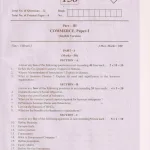Corporate accounting is essential for understanding the financial management of businesses. This comprehensive guide includes solved questions and answers for various corporate accounting topics. It is tailored for students preparing for exams or anyone seeking a better understanding of financial statements, share capital, mergers, and other corporate topics.
Corporate Accounting Basics
Question: What is corporate accounting?
Answer: Corporate accounting is the process of recording, analyzing, and reporting the financial transactions of a corporation.
Question: What are the main objectives of corporate accounting?
Answer: The main objectives are to maintain accurate financial records, prepare financial statements, and ensure compliance with laws.
Question: What is a balance sheet?
Answer: A balance sheet is a financial statement showing a company’s assets, liabilities, and equity at a specific point in time.
Question: What is the difference between authorized and issued share capital?
Answer: Authorized share capital is the maximum amount a company can issue, while issued share capital is the amount actually issued to shareholders.
Question: What is the purpose of preparing financial statements?
Answer: The purpose is to provide stakeholders with a clear understanding of the company’s financial performance and position.
Question: What is goodwill in accounting?
Answer: Goodwill is an intangible asset representing the value of a company’s reputation, customer base, and other non-physical assets.
Question: What is the treatment of preliminary expenses in corporate accounting?
Answer: Preliminary expenses are shown as deferred expenses and written off over a period.
Question: What is the accounting treatment for dividends?
Answer: Dividends declared are treated as a liability and recorded as an expense in the profit and loss account.
Question: What is the difference between reserves and provisions?
Answer: Reserves are appropriations of profit, while provisions are set aside for specific liabilities or losses.
Question: What is the meaning of consolidation in corporate accounting?
Answer: Consolidation refers to combining financial statements of a parent company with its subsidiaries.
Corporate Accounting Advanced Topics
Question: What is the accounting treatment for a merger?
Answer: In a merger, the books of the merged company are closed, and the accounts are combined with the surviving company.
Question: What are debentures in corporate accounting?
Answer: Debentures are a type of long-term debt instrument issued by a company to raise funds.
Question: How is goodwill calculated during an acquisition?
Answer: Goodwill is calculated as the purchase price minus the fair value of the acquired company’s net assets.
Question: What is the difference between equity shares and preference shares?
Answer: Equity shares carry voting rights and dividends depend on profits, while preference shares provide fixed dividends and no voting rights.
Question: What is the treatment for share premium in accounting?
Answer: Share premium is recorded in a separate account and can be used for purposes like issuing bonus shares.
Question: What is the purpose of an audit in corporate accounting?
Answer: The purpose is to ensure the accuracy and reliability of financial statements.
Question: What is the accounting treatment of forfeited shares?
Answer: Forfeited shares are credited to a forfeited shares account and can be reissued at a later stage.
Question: What is a contingent liability?
Answer: A contingent liability is a potential obligation that may arise depending on the outcome of a future event.
Question: What are the components of the statement of cash flows?
Answer: The components are operating activities, investing activities, and financing activities.
Question: What is the importance of corporate governance in accounting?
Answer: Corporate governance ensures transparency, accountability, and ethical practices in financial reporting.
Accounting Standards and Principles
Question: What is IFRS in accounting?
Answer: IFRS stands for International Financial Reporting Standards, which provide guidelines for preparing financial statements.
Question: What is GAAP?
Answer: GAAP stands for Generally Accepted Accounting Principles, which are standard guidelines for financial reporting in the U.S.
Question: What is the accrual basis of accounting?
Answer: The accrual basis recognizes revenue and expenses when they are earned or incurred, regardless of cash flow.
Question: What is the historical cost principle?
Answer: It is the accounting principle where assets are recorded at their original purchase price.
Question: What is the matching principle in accounting?
Answer: The matching principle requires that expenses be recorded in the same period as the revenues they help generate.
Question: What is the principle of materiality?
Answer: Materiality states that all significant financial information must be disclosed in financial statements.
Question: What is the revenue recognition principle?
Answer: It requires that revenue is recognized when it is earned, regardless of when payment is received.
Question: What is the purpose of accounting standards?
Answer: Accounting standards ensure consistency, transparency, and comparability of financial statements across entities.
Question: What is fair value accounting?
Answer: Fair value accounting measures assets and liabilities at their current market value.
Question: What is the prudence concept in accounting?
Answer: The prudence concept ensures that revenues and profits are not overstated, and liabilities and expenses are not understated.
Corporate accounting requires a solid understanding of fundamental principles, advanced topics, and standards. These questions and answers cover essential aspects to help learners gain practical knowledge and confidence for exams or professional applications.
Latest Posts
- Step-by-step guide to download and apply for jee mains admit card 202
- Comprehensive 2025 government holidays and recruitment details for job seekers
- JEE Mains Admit Card 2025: Your Step-by-Step Guide to Downloading the Hall Ticket
- Everything You Need to Know About 2025 Government Holidays Recruitment
- Comprehensive Guide to rrb d group recruitment 2025 – Eligibility, Vacancies, and Application
- Detailed guide to nps trust recruitment 2025 vacancies, eligibility and apply process
- Comprehensive guide to hpcl recruitment 2025 notification, vacancies, and application process
- ignou bed admission 2025 complete recruitment guide with eligibility and process
- Comprehensive Guide to Indian Army Agniveer Recruitment 2025 Notification and Jobs
- Everything You Must Know About CBSE Board Exams 2025 Changes & New Rules






